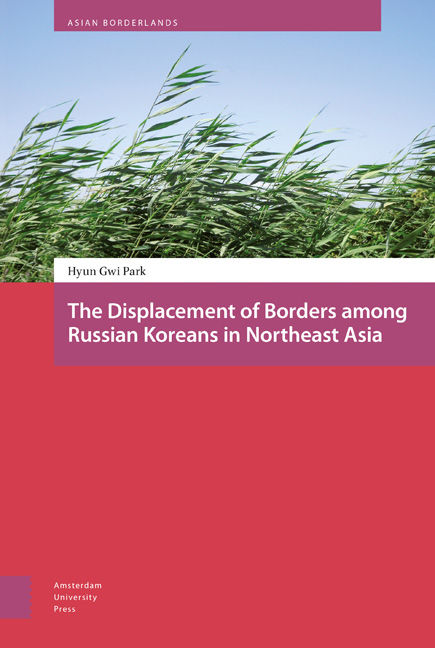Book contents
- Frontmatter
- Dedication
- Contents
- List of Maps, Figures and Tables
- Acknowledgements
- Note on transliteration, translation, and names
- Preface: Clearing the Ground
- Introduction: the Obscure Presence of Russian Koreans in Northeast Asia
- 1 The History of âthe Korean Questionâ and Border-Making in the Russian Far East
- 2 Repatriating to the Russian Far East, Confronting the Transition
- 3 Living Soviet Socialism the Korean way: Mobile Agriculture at the Border of Socialism
- 4 Greenhouse Society: the Subsistence Economy and Householding
- 5 Recalling History: Koreiskii Dom, Transnational Connections, and Diaspora Politics
- Epilogue
- Appendix 1
- Appendix 2
- Glossary
- Bibliography
- Index
4 - Greenhouse Society: the Subsistence Economy and Householding
Published online by Cambridge University Press: 12 February 2021
- Frontmatter
- Dedication
- Contents
- List of Maps, Figures and Tables
- Acknowledgements
- Note on transliteration, translation, and names
- Preface: Clearing the Ground
- Introduction: the Obscure Presence of Russian Koreans in Northeast Asia
- 1 The History of âthe Korean Questionâ and Border-Making in the Russian Far East
- 2 Repatriating to the Russian Far East, Confronting the Transition
- 3 Living Soviet Socialism the Korean way: Mobile Agriculture at the Border of Socialism
- 4 Greenhouse Society: the Subsistence Economy and Householding
- 5 Recalling History: Koreiskii Dom, Transnational Connections, and Diaspora Politics
- Epilogue
- Appendix 1
- Appendix 2
- Glossary
- Bibliography
- Index
Summary
My vyzhivaem, kto kak mozhet (‘We are surviving, as one somehow does’). We are edinstvennyi narod (‘the only nation’) that does not ask for and does not count on the help of the state. My prosto privykli – tol’ko na sebia (‘We’ve just got used to it – only relying on ourselves’). In summer, we grow vegetables in the sovkhoz,1 and at the beginning of winter we make a living by standing in the market and trading. Marta Ivanovna's interview with a newspaper reporter ‘Eleven months passed’, February 1995, 2(13), Wondong Newspaper
In the post-Soviet transition, economic turbulence led many people to turn to the land, mostly to their ogorod (‘backyard kitchen garden’), for the sustenance of everyday life. This is a well-known pattern and Russian Koreans were no exception, although their cultivation activity appears to have been more successful than many: some Koreans have even managed to develop their cultivation into commercial ventures beyond mere subsistence farming.
In a study of post-socialist economic change in Siberia, Humphrey (2002a) critically examines the applicability of the concept of ‘domestic mode of production’ (DMS, hereafter) proposed by Marshall D. Sahlins (1974) through an example of the Buryats in a collective farm in Siberia. Humphrey criticizes Sahlins’ notion of a subsistence economy for two reasons. First, given the dependence of each household on the state enterprise for material and equipment like fodder and agricultural machinery on a Siberian collective farm in the early 1990s, the application DMS's presumed household self-sufficiency is problematic. In other words, the fact that the domestic economy is forced to retain its connection with the outside world is not given ample consideration in Sahlins’ theory. Second, she criticizes his a priori presumption of equality within the household and his analytical neglect of internal differences such as gender and age that lead to different obligations and rewards. Sahlins’ notion of DMS is largely based on the concept of a natural economy and thereby leads to very functionalist interpretations, which Donald L. Donham (1981) considers to be neoclassical theory.
While I agree with such critiques of Sahlins's (1974) work, in this chapter I want to address the issue of the ‘subsistence’ or ‘independence’ of the Korean household as a moral construction, rather than as an economic reality.
- Type
- Chapter
- Information
- Publisher: Amsterdam University PressPrint publication year: 2017



